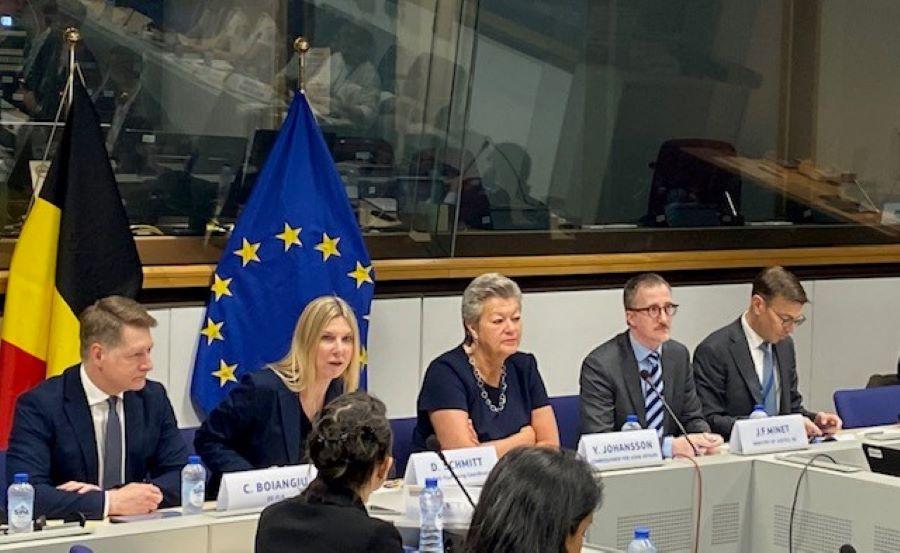
On 17 and 18 June, more than 130 participants from EU Member States, Moldova and Ukraine, the EU Agencies and civil society organisations attended the EU Network of National Coordinators and Rapporteurs on trafficking in human beings meeting in Brussels. The meeting mainly focused on trafficking for labour exploitation and forced criminality.
The meeting was co-chaired by Diane Schmitt, EU Anti-Trafficking Coordinator, and Jean-François Minet from the Ministry of Justice of Belgium, representing the Belgium Presidency of the Council. Ylva Johansson, Commissioner for Home Affairs, Paul Van Tigchelt, Deputy Prime Minister and Minister for Justice and the North Sea of Belgium and Cosmin Boiangiu, Executive Director of the European Labour Authority delivered the keynote speeches of the opening session.
Participants discussed the challenges in detecting and combatting trafficking for the purpose of labour exploitation as well as labour exploitation in high-risk sectors such as agriculture, construction, domestic services, nail salons, cleaning services, etc. They recognised that the identification of the victims is challenging, as they often work in isolation, sometimes in private homes or in remote locations, not knowing their rights or being dependent on their employer. Another challenge is the distinction between labour exploitation as form of trafficking in human beings and offences under criminal law.
Additionally, participants emphasised the protection of victims as well as the prevention, cooperation and the role of the private sector, in addressing the demand of trafficking for labour exploitation. Discussions highlighted the need for targeted actions to protect victims. One of the keys for successful actions is strong coordination between law enforcement and the labour inspectorates. Furthermore, participants stressed the importance of engagement with private sector, employers and trade unions as well as raising the awareness on trafficking in human beings to ensure that workers, also from non-EU countries, are aware of their rights.
Another topic was forced criminality as a form of human trafficking. Discussions focused on the detection, links with other crimes and the non-prosecution-principle. Recent cases in the EU show that this form of trafficking increases. For example, criminal networks often use children, forcing them to serve in drug trafficking or to commit burglaries. The participants discussed how to identify and recognise victims as victims, given that they may be perceived as perpetrators. It was underlined that law enforcement and judicial authorities need to be better trained and informed about this specific form of trafficking and only consequent decriminalisation can lead to recovery and the reintegration of child victims into the society.
The meeting of the Network proved the importance of cross-border cooperation, including the support of EU agencies and in the context of EMPACT operational actions. It was also useful in the context of the implementation of the new revised Anti-Trafficking Directive.
Details
- Publication date
- 20 June 2024
- Author
- Directorate-General for Migration and Home Affairs
